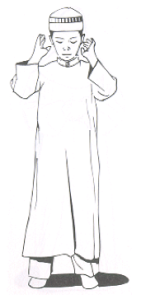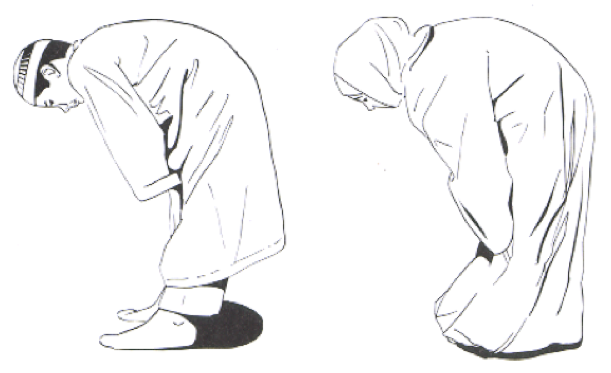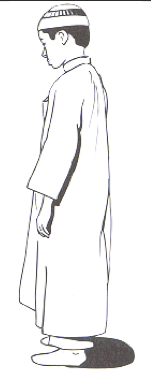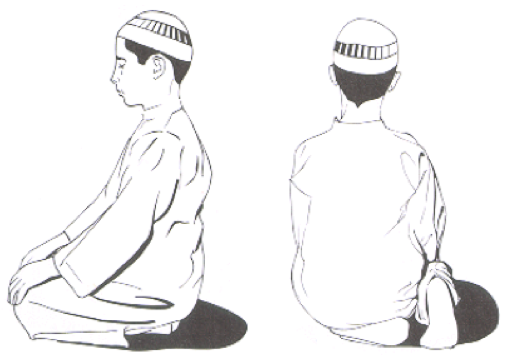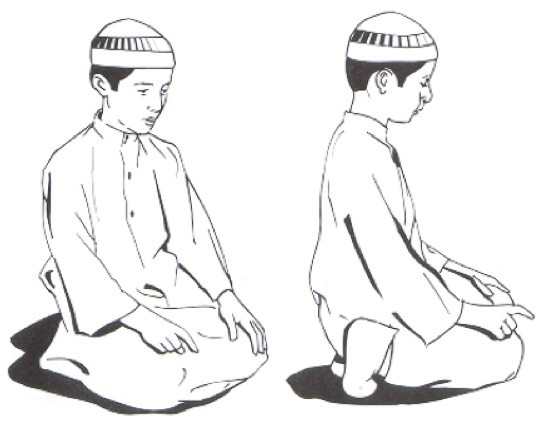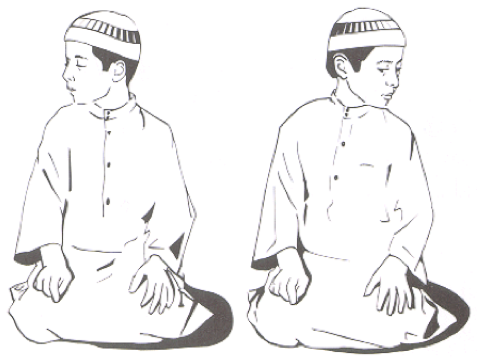Category Archives: Youth
Salat According to Shafii Fiqh
بسم الله الرØمن الرØيم
Book of Salat (Shafi`i)
The Five Obligatory Prayers
The Messenger of Allah (s) said: “There are five prayers that Allah obligated the slaves to perform. Whoever performs them properly without belittling their obligation, Allah promised to admit him into Paradise. Whoever leaves them out does not have a promise from Allah to enter Paradise without being punished first. If He willed, He tortures him, and if He willed, He forgives him†– Narrated by Ahmad in his Musnad. As such, it is obligatory to perform each of these five prayers in its due time. It is better to perform each prayer early in its time.
Subh or Fajr (Dawn) Prayer – 2 raka`ats (Cycles)
The true dawn begins when we see light spread at the horizon in the East. When the true dawn appears the Fajr prayer time has begun and this prayer time remains until the first glimpse of the disk of the sun appears on the Eastern horizon.
Zhuhr (Noon) Prayer – 4 raka`ats (Cycles)
Its time begins when the sun has declined westward from the middle of the sky (zenith). The time remains until the length of the shadow of an object becomes equal to that of the object per se, in addition to the length of the shadow of that object when the sun was at its zenith. For example, if the length of your shadow when the sun is at its zenith is 5 feet and you are 6 feet high, then once your shadow becomes 11feet long the Zhuhr prayer time ends.
`Asr (Mid-afternoon) Prayer – 4 raka`ats (Cycles)
As soon as the Dhuhr prayer time ends the Asr prayer time starts. Its time remains until sunset.
Maghrib (Sunset) Prayer – 3 raka`ats (Cycles)
After the entire disk of the sun has set, then the Maghrib prayer time begins. This prayer time lasts until the redness has disappeared in the western horizon.
`Isha’ (Nightfall) Prayer – 4 raka`ats (Cycles)
As soon as the Maghrib prayer time is finished the Isha’ prayer time begins. You can be certain that this prayer time is in when you can see many small stars in the sky on a clear night. This prayer time lasts until the true dawn appears.
Conduct of Salat
Sutra
Before a person starts to pray he should place something a short distance in front of him of the place where he prostrates (does sajda). Such an object is called sutra and is used when the person is praying alone. A person passing in front of the person in prayer, should pass on the outside of the sutra. If someone is praying in congregation, then the imam acts as the sutra. The imam, however, must have his own individual sutra in front of him.
Qiblah
Wherever a person is in the world, he should face towards the Ka’bah when he is going to pray. The Ka`bah is in the sacred masjid of Makkah in Saudi Arabi. Facing towards Qiblah (Ka`bah) is a very important condition of performance of prayer.
Niyyah, Intention
After facing the Qiblah the person should make niyyah (intention). The intention is made within his mind, so the person should think about the particular obligatory, optional or nafl prayer he intends to perform.
Takbir Tahrimah – Takbirat al-Ihram
After making Niyyah the person should start his prayer saying “Allahu Akbar†(Allah is the greatest) raising both of his hands to the shoulders, with fingers stretching to the ear lobes. (For Hanafis, the thumbs should rub against the ear lobes).
He should then fold his hands in between his chest and navel (Shafi`i) or on the navel (Hanafi) with his right hand over the left hand. This time “Allahu Akbar†is called Takbir Tahrimah because after saying Takbir Tahrimah every common and worldly action, talk or movement is forbidden. Throughout the prayer the eyes of the worshiper should point to the spot where the forehead rests in sajda.
Recitation Before Surat al-Fatiha
There are several du`as (invocations) the Prophet (s) recited before Fatihah:  اللَّهÙÙ…ÙŽÙ‘ باعÙدْ بَيْني ÙˆÙŽ بَيْنَ خَطايايَ كَما باعَدْتَ بَيْنَ المَشْرÙÙ‚Ù ÙˆÙŽ المَغْرَبÙØŒ اللَّهÙÙ…ÙŽÙ‘ Ù†ÙŽÙ‚Ùّني Ù…ÙÙ† خَطايايَ كَما ÙŠÙنَقّى الثَّوْب٠الأَبْيَض٠مÙÙ†ÙŽ الدَّنَسÙØŒ اللَّهÙÙ…ÙŽÙ‘ اغْسÙلْني Ù…ÙÙ† خَطايايَ بÙالماء٠وَ الثَّلْج٠وَ البَرَدÙ.
Allahuma bai`d baynee wa bayna khataya kama ba-`adta bayn al-mashriqi wa’l-maghrib. Allahuma naqiniyy min al-khataya kama yunaqqi ath-thawba min ad-danas. Allahuma ‘ghsilniyy min khataya bi ‘l-mai wa ‘th-thulji wa ‘l-barad
O Allah set me apart from my sins as East and West are apart from each other. O Allah, cleanse me from my sins as a white garment is deansed from dirt after thorough washing. O Allah, wash me off from my sins with water, snow and hail.
If a person does not know the above du`a then he should recite the following one:
سÙبْØانَكَ اللَّهÙÙ…ÙŽÙ‘ ÙˆÙŽ بÙØَمْدÙÙƒÙŽ ÙˆÙŽ تَبارَكَ اسْمÙÙƒÙŽ ÙˆÙŽ تَعالى جَدÙّكَ ÙˆÙŽ لا Ø¥Ùلهَ غَيْرÙÙƒ
Subhanak Allahuma wa bi-hamdika wa tabaraka ismuka ta`ala jaduka wa la ilaha ghayruka.
Glory be to you, O Allah, and all praises are due unto you, and blessed is your name and high is your majesty and none is worthy of worship but you.â€
Ta`awwudh Tasmiyya (Basmala)
Then the person who is praying should recite the following silently:
أَعوذ٠بÙالله٠مÙÙ†ÙŽ الشَّيْطان٠الرَّجيمÙ. بÙسْم٠الله٠الرَّØْمن٠الرَّØÙيم
a`udhu billah mina ‘sh-shaytani ‘r-rajeem Bismillahi ‘r-Rahmani ‘r-Raheem
I seek Allah’s protection from Satan the accursed. In the name of Allah, The Beneficent and The Merciful†(The Basmalah should be said in every raka`at before reciting Surah Al-Fatihah.)
Surat al-Fatiha
Then the person should recite Surat al-Fatihah:
الْØَمْد٠لله٠رَبÙÙ‘ الْعالَمينَ۞ الرَّØْمن٠الرَّØيمÙÛž مالÙك٠يَوْمَ الدّينÙÛž Ø¥Ùيّاكَ نَعْبÙد٠وَ Ø¥Ùيّاكَ نَسْتَعينَ۞ اÙهْدÙنا الصÙّراطَ الْمÙسْتَقيمَ۞ صÙراطَ الَّذيْنَ أَنْعَمْتَ عَلَيْهÙمْ غَيْر٠الْمَغْضوب٠عَلَيْهÙمْ ÙˆÙŽ لا الضَّآلÙّينَ۞ آمين.
Alhamdu lillahi Rabbi ‘l-`alamin ar-Rahmani ‘r-Raheem Maliki yawmi-d-Din. Iyya-ka na`budu wa iyyaka nasta`een, ihdina ‘s-sirat al-mustaqim, sirat alladheena an`amta `alaihim ghair il-Maghdubi `alaihim wa la-d-daalleen
Praise is only for Allah, Lord of the Universe. The most kind, the most merciful. The master of the Day of Judgment. You alone we worship and to you alone we pray for help. Show us the straight way, the way of those whom you have blessed. Who have not deserved your anger, Nor gone astray.â€
Reciting al-Fatihah is so important that Prophet Muhammad (s) said that no prayer was acceptable without the recitation of al-Fatihah.
Ameen
It is sunnah to say Ameen when a person finishes recitation of Surah Al-Fatihah. If he is praying alone he should say “Ameen†in silence and if he is praying with congregation behind an Imam then he should say Ameen fairly loudly when the Imam finishes saying the last verse of Surah Al-Fatihah. When saying Ameen the voice of the whole congregation should resound at the same time.
Recitation After Surat al-Fatiha
It is sunnah for a person who is praying that he should read a surah from Quran after al-Fatihah in the first two raka`ats of the fard prayer. Here are a few short surahs which you can recite.
Surat al-Ikhlas
بÙسْم٠الله٠الرَّØْمن٠الرَّØÙيمÙ
Ù‚Ùلْ Ù‡ÙÙˆÙŽ الله٠أَØَدٌ۞ الله٠الصَّمَدÙÛž Ù„Ùمْ ÙŠÙŽÙ„Ùدْ ÙˆÙŽ لَمْ يولَدْ۞ ÙˆÙŽ لَمْ ÙŠÙŽÙƒÙنْ Ù„ÙŽÙ‡Ù ÙƒÙÙÙواً Ø£ÙŽØَدÙÛž
Qul huwa allahu ahad allahu ‘s-samad lam yalid wa lam yoolad wa lam yakun lahu kufuwan ahad
Say: He is Allah, the only one. Allah helps and does not need help. He does not produce a child, and He Was not born of anyone. There is no one like unto Him.
Surat al-Falaq
بÙسْم٠الله٠الرَّØْمن٠الرَّØÙيمÙ
Ù‚Ùلْ أَعوذ٠بÙرَبÙÙ‘ الْÙÙŽÙ„ÙŽÙ‚ÙÛž Ù…Ùنْ شَرÙÙ‘ ما خَلَقَ۞ ÙˆÙŽ Ù…Ùنْ شَرÙÙ‘ غاسÙق٠إÙذا وَقَبَ۞ ÙˆÙŽ Ù…Ùنْ شَرÙÙ‘ النَّـÙَّثَّـت٠ÙÙŠ الْعÙقَدÙÛž ÙˆÙŽÙ…Ùنْ شَرÙÙ‘ ØاسÙد٠إÙذَا Øَسَدَ۞
Qul a`udhu bi rabbi’l-falaq min sharri ma khalaq wa min sharri ghasiqin idha waqab wa min sharri’n-nafaathati fi’l-`uqad wa min sharri hasidin idha hasad.
Say: “I seek refuge in the Lord of the dawn, from the evil of all that He has treated, and from the evil of the darkness of night when it falls, and from the evil of those (charmers) who blow into knots. And from the evil of the envier when he envies.â€
Surat an-Nas
بÙسْم٠الله٠الرَّØْمن٠الرَّØÙيمÙ
Ù‚Ùلْ أَعÙوذ٠بÙرَبÙÙ‘ النَّاسÙÛž Ù…ÙŽÙ„Ùك٠النَّاسÙÛž Ø¥Ùله٠النَّاسÙÛž Ù…Ùنْ شَرÙÙ‘ الْوَسÙواس٠الْخَنَّاسÙÛž الَّذÙÙŠ ÙŠÙوَسْوÙس٠ÙÙÙŠ صÙدÙور٠النَّاسÙÛž Ù…ÙÙ†ÙŽ الْجÙنَّة٠وَ النَّاسÙÛž
Qul a`udhu bi rabbi ‘n-nas maliki ‘n-nas ilahi ‘n-nas, min sharri ‘l-was-wasi ‘l-khannas alladhee yuwaswisu fee sudoori ‘n-nas min al-jinnati wa ‘n-nas.
Say: “I seek refuge in the sustainer of mankind. the Owner of Mankind, Lord of Mankind. From the evil of the sneaking whisperer. Who whispers in the hearts of mankind. (Whether he be) from among jinns or mankind.â€
Ruku` -Â Bowing
Then the person praying should say “Allahu Akbar†raising both his hands to shoulder level with the palms facing outwards and fingers stretching to earlobes. He should then bend in ruku` so that his trunk (i.e. from head to hips) is perpendicular to the rest of the body. His hands should rest on his knees with the fingers spread apart, taking care that his arms do not touch his body. The person should be calm and composed in the ruku` posture and not hurry it.
سÙبْØانَ رَبÙّيَ الْعَظيم
Then he should read :â€Subhana Rabbiyy al-`azeem†at least three times. This means: “Glory be to my Lord Who is the Greatest.â€
Perfection of Ruku` and Sajda
Abi Masud al Badri (r) reported that the Messenger of Allah (s) said:
“Allah does not consider the prayer of a man who does not straighten his back when bowing for ruku` and performing Sajdah.†(Ibn Khuzaimah, Ibn Hibban, Tabrani)
Abi Qatadah (r) reported that the Messenger of Allah (s) said: ‘‘The worst thief is one who steals in his prayer.â€
Then the companions asked, “How can someone steal from his prayer?†Prophet (s) answered, “He does complete his ruku` and sajda with perfection.†(Ahmad, Tabrani, Ibn Khuzaimah, Hakim).
These hadiths prove that ruku` and sajda should be done calmly, slowly and perfectly. Otherwise the salat of the person will be deficient.
Qawmah/I`tidal – Standing after Ruku`
After the perfect ruku` the person praying should raise his head from ruku` saying:
سَمÙعَ الله٠لÙمَنْ ØÙŽÙ…Ùدَه
Sami` allahu liman hamidah “Verily Allah listens to the one who praises Him.â€
One should raise the hands up to the level of his shoulders with palms facing outwards and fingers stretched to the earlobes and then he should lower his hands to his sides. In the standing position he should be erect so that the joints of his body go back in place.
Du`as in Qawma
رَبَّنا Ù„ÙŽÙƒÙŽ الْØمْد٠Øَمْداً ÙƒÙŽØ«Ùيراً Ø·ÙŽÙŠÙّبَاً Ù…Ùبَارَكاً ÙÙيهÙ
Rabbana laka ‘l-hamd, hamdan kathiran tayyiban mubarakan feehi. Oh our Lord, all praises be to You, Very many, pure and blessed praises be to You.â€
First Sajda – Prostration
After the perfect qawmah the person praying should move to perform sajda saying:- “Allahu Akbar,†putting palms downwards on the ground below the ears. The knees should be brought downwards on the ground. His fingers and toes should be pointing towards Qiblah without spreading the fingers of the hands. In this position he should say:
سÙبْØَانَ رَبÙّيَ الْأَعْلى
Subhan Rabbee al-`Ala – “Oh Allah, glory be to you, the most high.†Importantly, during prostration seven parts of the body should touch the ground:
- The forehead along with the tip of the nose
- Both hands
- Both knees
- The bottom surface of the toes of both feet
Jalsa – Sitting Between Two Sajdas
After performing one sajda perfectly and calmly, the person praying should raise his head from sajda saying, “Allahu akbar“, bending the left foot and sitting on it while ‘keeping the right foot propped up with its toes pointing towards the Qiblah, the palms of his hands should rest on his thighs and knees. the back should be straight so that the joints go back in place. It is Sunnah to say the following du`a while sitting in between the two sajdas:
اللَّهÙÙ…ÙŽÙ‘ اغْÙÙرْلي ÙˆÙŽ ارْØَمْنÙÙŠ ÙˆÙŽ اهْدÙÙ†ÙÙŠ ÙˆÙŽ عَاÙÙÙ†ÙÙŠ ÙˆÙŽ ارْزÙقْنÙÙŠ ÙˆÙŽ اجْبÙرْنÙÙŠ ÙˆÙŽ ارْÙَعْنÙÙŠ
Allahuma ighfir lee w ‘arhamniyy w ‘ahdiniyy w ‘arzuqniyy w ‘ajburniyy w’arfa`niyy
Oh Allah, forgive me, and have mercy on me, and keep me on the right path, and keep me healthy, and provide me with halal sources of living, and complete my shortcomings, and make my rank high.â€
Second Sajda
Then the person should perform the second sajda saying, “Allahu Akbar†and repeat what he did in the first sajda.
Jalsa Istaraahat – Sitting for Rest
Then he should raise his head up saying. “Allahu Akbar†and sit for a short while as he did in jalsa. He does this before standing up for the second raka`at.
Second Raka`at
After standing up for the second raka`at he should fold his hands over his chest as he did in the first raka`at and start his recitation by reading “Basmalah and Surah-Fatihah followed by any passage or a chapter of the Holy Quran.†Then he should complete his second raka`at in the manner of the first one.
While choosing a passage or a chapter for the recitation in the second or a subsequent raka`at the worshipper should observe the order in which they occur in the Holy Quran. Also, each Surah or verse should be shorter than the one recited before it. Hence, longer surahs are recited before shorter surahs.
Tashahhud
After completing the last sajda of the second raka`at, the person should raise his head saying: “Allah Akbarâ€. He should sit as he sat between the two sajda, putting his left hand on his left knee and right hand on his right knee. The fist of the right hand is closed except for the index finger which is protruded.
التَّØÙيَّات٠لله ÙˆÙŽ الصَّلَوَات٠وَ الطَّيÙّبَات٠السَّلاَم٠عَلَيْكَ Ø£ÙŽÙŠÙّهَا النَّبيÙÙ‘ ÙˆÙŽ رَØْمَة٠الله٠وَ بَرَكَاتÙه٠السَّلاَم٠عَلَيْنَا ÙˆÙŽ عَلَى عÙبَاد٠الله٠الصَّالÙØÙينَ
أَشْهَد٠أَنْ لا إلهَ إلا الله٠وَ أَشْهَد٠أَنَّ Ù…ÙØَمَّداً عَبْدÙه٠ورَسÙولÙÙ‡Ù
At-tahiyyatu lillahi wa ‘s-salawatu wa ‘t-tayyibatu as-salamu `alayka ayyuha’n-nabiyyu wa rahmatullahi wa barakatuh as-salamu `alayna wa `ala `ibadillahi’s-saliheen ashadu an la ilaha illa Allah wa ashhadu anna Muhammadan `abduhu wa rasuluh.
All the salutations, prayers and good things are for Allah. Peace be on you O Prophet, and the blessings of Allah, and His grace. Peace on us and on all the righteous servants of Allah. I bear witness that none but Allah is worthy of worship and bear witness that Muhammad is the Servant and Messenger of Allah.
While reading “Ash hadu ……`abduhu wa rasuluh.†A person should raise the index finger of his right hand slightly and return it to its previous position after he has finished saying it. A person praying 2 raka`ats only should end with salat with Salawat Ibrahimiyyah.
Standing Up for the Third Raka`at
If a person is praying three or four raka`ats, then he should stand up after tashahhud saying “Allahu Akbar†and raising his hands as he did in Takbir Tahrimah start his recitation with of Basmalah, Surah Al-Fatihah and then a short surah.
Salawat Ibrahimiyyah
After the mentioned recitation one should continue to complete his third raka`at (or fourth raka`at). In the last raka`at, after reciting the Tashahhud, the Salawat Ibrahimiyyah must be recited:
اللّهÙÙ…ÙŽÙ‘ صَلÙÙ‘ عَلَى Ù…ÙØَمَّد٠وَ عَلَى آل٠مÙØمَّد٠كمَا صَلَّيْتَ عَلَى Ø¥Ùبْراهيمَ ÙˆÙŽ عَلَى آل٠إبْرَاهيمَ ÙˆÙŽ بَارÙكْ عَلَى Ù…ÙØمَّد٠وَ عَلَى آل٠مÙØمَّد٠كمَا بَارَكْتَ عَلَى إبْرَاهيمَ وَعَلَى آل٠إبْرَاهيمَ إنَّكَ ØÙŽÙ…Ùيدٌ مَجÙيدٌ
Allahumma salli `ala Sayyidina Muhammadin wa `ala ali Sayyidina Muhammadin kama sallaita `ala Sayyidina Ibrahima wa `ala ali Sayyidina Ibrahima Innaka hameedun Majid Allahumma barik `ala Sayyidina Muhammadin wa `ala ali Sayyidina Muhammadin kama barakta `ala Sayyidina Ibrahima wa `ala ali Sayyidina Ibrahima Innaka hamidun Majeed,
Oh Allah, send grace and honour on Muhammad and on the family and true followers of Muhammad, just as you sent Grace and Honour on Ibrahim and on the family and true followers of Ibrahim. Surely, you are praiseworthy, the Great.â€
Du`as After Salawat Ibrahimiyyah
There are several Du`as which Prophet (s) used to say after Salawat Ibrahimiyyah and he taught them to the companions. Some are as follows:
i) `Abdullah ibn `Amr (r) said that Abu Bakr (r) said to the Messenger of Allah,â€Please teach me a du`a so I can say it in my prayer.†So the Messenger of Allah said:
اللَّهÙÙ…ÙŽÙ‘ Ø¥ÙÙ†Ùّي ظَلَمْت٠نَÙْسÙÙŠ ظÙلْمًا ÙƒÙŽØ«Ùيرًا ÙˆÙŽ لا يَغْÙÙر٠الذÙّنÙوبَ Ø¥Ùلا أَنْتَ ÙَاغْÙÙرْ Ù„ÙÙŠ مَغْÙÙرَةً Ù…Ùنْ عÙنْدÙÙƒÙŽ ÙˆÙŽ ارْØَمْنÙÙŠ Ø¥Ùنَّكَ أَنْتَ الْغَÙÙور٠الرَّØÙيمÙ
Allahuma innee zhalamtu nafsee zhulman kabeera wa la yaghfir adh-dhunuba illa anta fagh-fir lee maghfiratan min `indika w ‘arhamnee innaka anta al-ghafooru ‘ r-raheem
Oh Allah, I have been very cruel to myself (by ignoring my duty to you) and there is no one who can forgive the sins except You. So forgive me because You are the only forgiver and have mercy on me. Verily You are The Forgiver and The Merciful.â€
ii) Shaddad ibn `Aws (r) reported that the Prophet of Allah (s) used to say in his prayer the following:
اللَّهÙÙ…ÙŽÙ‘ Ø¥ÙÙ†Ùّي أَسْأَلÙÙƒÙŽ الثَّبَاتَ ÙÙÙŠ الْأَمْر٠وَ الْعَزÙيمَةَ عَلَى الرÙّشْد٠وَ أَسْأَلÙÙƒÙŽ Ø´Ùكْرَ Ù†ÙعْمَتÙÙƒÙŽ ÙˆÙŽ ØÙسْنَ عÙبَادَتÙÙƒÙŽ ÙˆÙŽ أَسْأَلÙÙƒÙŽ قَلْبًا سَلÙيمًا ÙˆÙŽ Ù„Ùسَانًا صَادÙقًا ÙˆÙŽ أَسْأَلÙÙƒÙŽ Ù…Ùنْ خَيْر٠مَا تَعْلَم٠وَ أَعÙوذ٠بÙÙƒÙŽ Ù…Ùنْ شَرÙÙ‘ مَا تَعْلَم٠وَ أَسْتَغْÙÙرÙÙƒÙŽ Ù„Ùمَا تَعْلَمÙ
Allahuma innee as’aluka’l-nabbaat fi’l amri wa’l-`azeemata `ala ‘r-rushdi wa as’aluka shukra ni`amatika wa husna `ibadatika wa as’alauka qalban saleeman wa lisaanan saadiqan wa as’aluka min khayri maa t`alamu wa a`udhu bika min sharri maa ta`alamu wa astaghfiruka lima ta`lamu.
Oh Allah, I ask You for strength in every matter of religion and a strong will power to be on the right path. And I ask You to make me thankful for Your bounties and give me the ability to worship You perfectly. And I ask You to make my heart sincere and my tongue truthful. I askYou for every goodness known to You and I seek refuge in you from everything bad that You know is bad. I ask Your forgiveness for all mistakes You know.â€
iii) Sayyida A`ishah (r) reported that the Prophet (s) used to say this du`a in his prayer:
Allahuma innee a`udhu bik min `adhab al-qabri wa a`udhu bika min fitnati’d-dajjaal wa a`udhu bika min fitnati’l-mahyaa wa’l-mamaati allahuma innee a`udhu bika min al-ma’thami wa’l-maghram
اللَّهÙÙ…ÙŽÙ‘ Ø¥ÙÙ†Ùّي أَعÙوذ٠بÙÙƒÙŽ Ù…Ùنْ عَذَاب٠الْقَبْر٠وَ أَعÙوذ٠بÙÙƒÙŽ Ù…Ùنْ ÙÙتْنَة٠الدَّجَّال٠وَ أَعÙوذ٠بÙÙƒÙŽ Ù…Ùنْ ÙÙتْنَة٠الْمَØْيَا ÙˆÙŽ الْمَمَاتÙØŒ اللَّهÙÙ…ÙŽÙ‘ Ø¥ÙÙ†Ùّي أَعÙوذ٠بÙÙƒÙŽ Ù…Ùنْ الْمَأْثَم٠وَ الْمَغْرَمÙ
Allahuma innee a`udhu bika min `adhabi ‘l-qabri wa a`udhu bika min fitnati ‘d-dajjal wa a`udhu bika min fitnati’l-mahya wa ‘l-mamat, allahuma innee a`udhu bika min al-mathammi wa ‘l-maghram.
Oh Allah I seek refuge in you from the punishment of the grave, and I seek refuge in you from the trial of the Dajjal, and I seek refuge in you from the trial of life and death. Oh Allah, I seek refuge in you from every kind of sin and unexpected troubles.â€
Ending the Prayer
After praying for himself as much as the person wishes he should end his prayer saying:
السَّلام٠عَلَيْكÙمْ ÙˆÙŽ رَØْمَة٠اللهÙ
as-salamu `alaykum wa rahmatullah – “Peace be on you and the mercy of Allah,†turning the face first to the right and then to the left, both times over the shoulder. This brings the two, three or four raka`ats of the prayer to completion.
Du`as After Salutations
There are many du`as which Prophet Muhammad (s) used to say after salutation. So, a person praying should try to memorize them and follow the practice of Prophet Muhammad (s). Some of these du`as we will mention here. It was the continuous practice of Prophet Muhammad (s) when he turned away from his prayer to say:
لا Ø¥Ùلهَ إلاّ الله
La ilaha illal’laah – There is no God but Allah (3 times)
أَسْتَغْÙÙر٠اللهَ، أَسْتَغْÙÙر٠اللهَ، أَسْتَغْÙÙر٠اللهَ
Astagfirullah – “I ask Allah to forgive me†(3 times)
اللَّهÙÙ…ÙŽÙ‘ أَنْتَ السَّلام٠وَ Ù…Ùنْكَ السَّلام٠تَبَارَكْتَ يَاذَا الجَلال٠وَ الإÙكْرامÙ
Allahumma anta ‘s-salamu wa minka ‘s-salamu tabarakta ya dhal-jalali wa ‘l-ikram
Oh Allah, you are the peace, And you are the source of peace, you are blessed, O possessor of Glory and Honor.(Muslim)
اللَّهÙÙ…ÙŽÙ‘ أَعÙÙ†Ùّي عَلَى Ø°ÙكْرÙÙƒÙŽ ÙˆÙŽ Ø´ÙكْرÙÙƒÙŽ ÙˆÙŽ ØÙسْن٠عÙبَادَتÙÙƒÙŽ
Allahumma a`innee `ala dhikrika wa shukrika wa husni `ibadatik
Oh Allah, help me torememberyou all the time, And tothankyou, and to worship you perfectly. (Ahmad, Abu Dawud)
لا Ø¥Ùلهَ إلاّ الله٠وَØْدَه٠لا شَرÙيكَ Ù„ÙŽÙ‡ÙØŒ له٠المÙلْك٠وَ له٠الØَمْد٠وَ هوَ عَلَى ÙƒÙلّ شَيْء٠قَدير
La ilaha illa ‘Llahu wahdahu la shareeka lahu lahu ‘l-mulku wa lahu ‘l-hamdu wa huwa `ala kulli shay-in Qadeer
There is no God but Allah, He is the only One and has no partner, Sovereignty and praise are only for Him. He has full authority over everything.
اللَّهÙÙ…ÙŽÙ‘ لا مَانÙعَ Ù„Ùما أَعْطَيْتَ ÙˆÙŽ لا Ù…ÙعْطÙÙŠÙŽ Ù„Ùما مَنَعْتَ ÙˆÙŽ لا يَنْÙَـع٠ذَا الجَـÙÙ‘ Ù…Ùنْكَ الجَد
Allahumma la mani`a lima a`tayta wa la mu`tiyya lima mana`ta wa la-yanfaw dhal-jaddi minka ‘l-jad
Nobody can prevent whatever you want to give and nobody can give whatever you want to prevent and a person with high rank cannot benefit himself or another from his high rank against your will. (Bukhari, Muslim)
سÙبْØَانَ الله٠(Û³Û³ مرة) ØŒ الْØَمْد٠لله٠(Û³Û³ مرة) ØŒ الله٠أَكْبَر٠(Û³Ù¤ مرة
It is Sunnah to say Subhan’Allah – “Glory be to Allah†(33 times), Alhamdulillah – “Praise be to Allah†(33 times), and Allahu Akbar – “Allah is the greatest†(34 times)
© 2012 As-Sunnah Foundation of America





